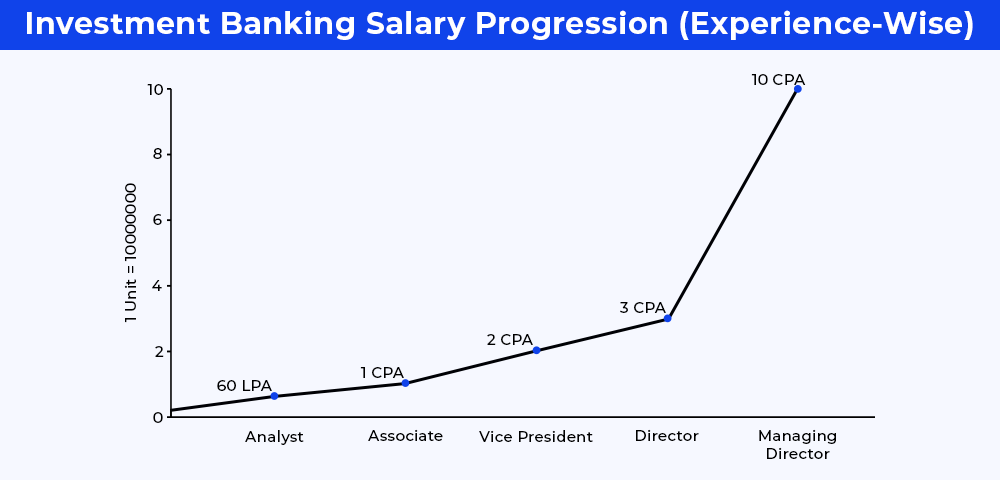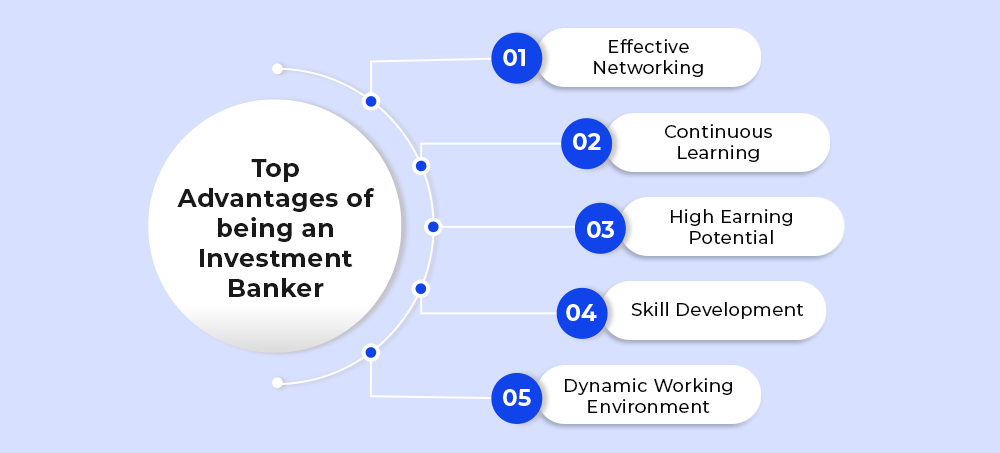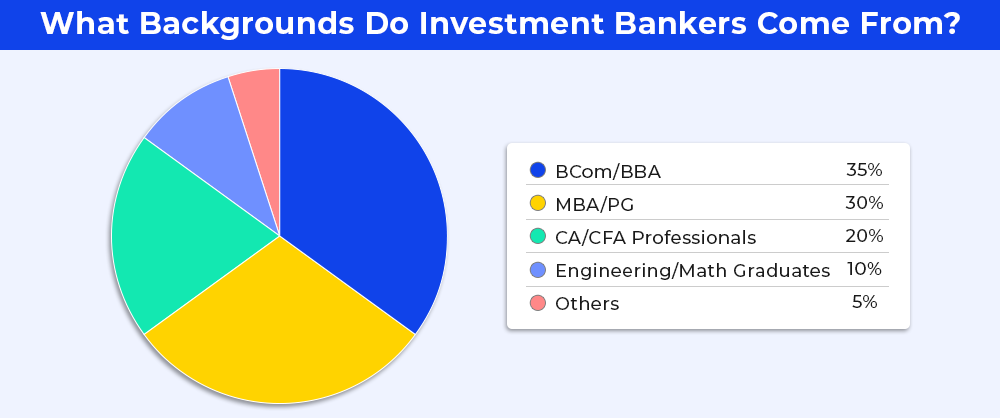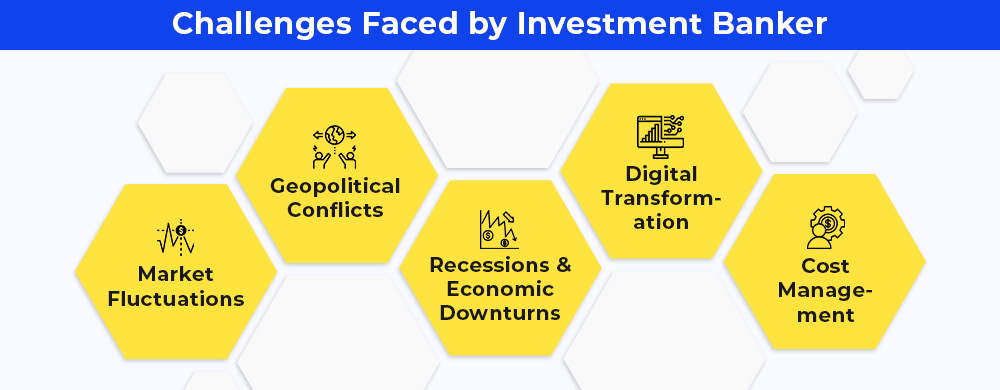Expert Interviews
- University Reviews
- Career Guide
 Video Counseling
Video CounselingImportant Facts
- Ask any Question - CV Forum

Investment Banking Jobs for Freshers: Skills, Salary & Career Growth
Isha Adhikari Sep 29, 2025 1.1K Reads

Investment banking has long been regarded as an occupation capable of yielding high incomes and is a dream career for both young and established professionals. However, what is getting less but much-deserved attention are the details behind how these salaries are made to work, who those fortunate enough to be paid them are, and what the future of these salaries is, especially with the future of automation catching up. So, we will take up each of them in detail.
Is Investment Banking A High-Paying Job?
Yes, investment banking is typically regarded as one of the best-paying jobs, particularly for those who reach the top of the ladder. Even first job analysts can expect to be highly paid; base salaries are frequently easily in the mid-five figures, and the bonus increases the annual payment substantially. It is not only the numbers but the possibility of quickly growing into six- or even seven-figure amounts that drew people to this industry.
Saying that, the trade-off in lifestyle may be high: long hours, high stress, and constantly driven deadlines. When they are establishing their careers, most investment bankers sacrifice work-life balance and personal free time to get larger compensation. Nevertheless, in case one works best under pressure, the benefits can be enormous.

How Much Do Investment Bankers Earn?
Earnings vary dramatically based on title, location, deal flow, and the overall health of financial markets. A first-year analyst in a major global hub typically earns between ₹40 lakh to ₹60 lakh per year in total compensation in India (base plus bonus). Senior bankers, such as managing directors, can surpass ₹5-10 crore annually during a good year.
Which Investment Bank Gives The Highest Salary?
Numerous investment banks give the highest salary to investment bankers. Banks like Morgan Stanley, Bank of America, Citigroup, etc., are a few banks that are very competitive when it comes to compensation. Such banks (deliberately known as the bulge bracket banks) provide the best bottom salaries and the sharpest bonus prospects, particularly at the senior ranks.
The competition stays afloat among domestic companies in India, such as Kotak, Axis, and ICICI Securities, especially in junior positions. However, to MDs and dealmakers, the best-paid jobs may turn out to be at foreign banks in India, with wider international exposure and the possibility of international movements.
Let’s take a glance at the top investment banks in the world that provide the highest salary packages:
- Boutique Banks
- Standard Chartered
- Morgan Stanley
- Société Générale
- USB Bank
- Bank of America
- Barclays
- Deutsche Bank
- Citigroup
- Santander

Will AI Replace Investment Bankers in the Future?
Although artificial intelligence and automation are transforming various tasks in the banking industry, Including Data analysis, risk modeling, and aspects of deal execution, investment banking remains primarily about relationships, trust, negotiation, and judgment. AI is unable to come up with the intuition and social sophistication required to do high-stakes advisory work and can only crunch numbers and identify trends.
Instead of replacing bankers, AI is supplementing what they can do. It focuses on standard work, enabling bankers to pay more attention to strategic thinking, customer interaction, and complex transactions. Therefore, even though AI will be at the center of determining the work processes in the future, a human component cannot be substituted.
Investment Banker Salary in India: Role-Specific Breakdown
Factors such as industry insights, location, years of work experience, recruiters, etc., play a major role in deciding the salary package of an investment banker in India. Let’s have a look at the tabular form to know more about the salary breakdown as per role:
|
Roles (No. of Working Experience) |
Base |
Bonus (%) |
Base |
|
Financial Analyst (0-2 years) |
INR 15-25 LPA |
50-100% of Base Salary |
INR 40 LPA to 60 LPA |
|
Associate (2-5 years) |
INR 30-45 LPA |
50–120% of Base Salary |
INR 60 LPA to 1 CPA |
|
Vice President/Senior Associate (5-8 years) |
INR 50 LPA - 1 CPA |
50-200% of Base Salary |
INR 1 CPA to 2 CPA |
|
Director/Executive Director (8-12 years) |
INR 1 CPA - 1.5 CPA |
50-200% of Base Salary |
INR 1.5 CPA to 3 CPA |
|
Managing Director (12+ years) |
INR 1.5 CPA |
Highly variable, often rivalry or exceeding the base salary (depends on the market status) |
INR 3 CPA or higher |
Note: These numbers reflect both foreign and domestic bank operations in India, with foreign banks typically paying more at senior levels.
Let’s have a look at the table showing the different job roles of the investment banking sector and their job description that you can join and earn a high-income salary package:
|
Job Roles in Investment Banking |
Job Description |
|
Financial Analyst (0-2 years) |
In investment banking, a financial analyst helps support big deals by analyzing data, building financial models and preparing presentations. It’s a high-pressure, learning-intensive position for recent graduates with good finance skills. An investment banking financial analyst helps support big deals by using data to build financial models and by creating presentations. It is high pressure and a steep learning curve for recent graduates with strong finance skills. |
|
Associate (2-5 years) |
An Associate in investment banking is that junior analyst’s team leader. They assist with major financial deals, such as mergers or initial public offerings. They review analysts’ work, talk to clients, create presentations, and ensure projects go smoothly. Associates can be given more responsibility and begin to guide the team and keep everything on track while still working long hours and learning from the senior bankers. |
|
Vice President/Senior Associate (5-8 years) |
A VP or Senior Associate in the investment banks is a kind of project manager. They source deals, they run teams, and they speak directly with clients, company’s C.E.O.s and so on. They critique models and presentations, ensure everything is correct and keep things moving. VPs serve as a bridge between senior bankers and the group, reconciling their need to knock down huge deals with training of juniors and happy clients. They weigh strategy, leadership and execution. |
|
Director/Executive Director (8-12 years) |
Director/Executive Director is one of the experienced positions in investment bank, which concentrates on the generation of business and establishing good relationships with customers. They head deal strategy, present ideas to CEOs and assist to close large transactions. Although they continue to be team guides, their primary responsibility is to win deals, increase the revenue of the bank and ensure that clients are satisfied. They are immediately below the Managing Director and they have an important role in the success of the bank. |
|
Managing Director (12+ years) |
An Investment bank’s MD (a Managing Director) is the person of rank, who has 12+ years of experience and is there to make big deals and satisfy important customers. They are exposed to CEOs, they profile new products and concentrate on generating wealth to the bank. MDs do not spend much time calculating numbers- they are at the guide of strategy, establishment of relationships with clients, and the overall direction of the entire team. They are primarily sales people whose responsibility is to secure business and ensure that deals close. |
Industry Insights
The salary of any profession is influenced by many factors, including the amount of working experience you have in that field, the recruiting company in which you are currently working, the position in which you are working, the status of the marketplace that directly affects the financial condition of any investment banking company, etc. Let’s know about each of the factors in detail:
Freshers vs. Experienced
Normally, fresh investment bank graduates begin their job tenure as analysts, and training and long workweeks are imminent after the commencement of their employment. The promotion to associate after two to three years implies increased responsibility and compensation as well as extended hours and pressures on duty.
Differences by Location
Mumbai is the center of the financial center of India, where most of the financial centers are well-paying, deal-rich, and have a large number of international banks. The introduction of investment banking in Delhi and Bengaluru is particularly strong, especially when it comes to infrastructure and tech transactions, whereas lower salary packages and fewer places to be hired are provided in smaller cities in general.
By Recruiters
The leading banks invest significantly in campus recruitments of top schools such as the Indian Institutes of Management (IIM), Indian Institutes of Technology (IIT), and leading finance colleges. The lateral hiring, i.e., recruitment of associates and above from rivals, also continues to be the norm, mostly at the mid-level and above positions.

How to Become An Investment Banker?
There is a systematic procedure for becoming an investment banker. This process includes the following steps:
Step 1: Complete your high school (10+2) education. The eligibility criterion is that you have to pass your exam with an aggregate score of 50% in any stream (Science, Commerce, and Arts). However, those who have completed their high school education from the Commerce stream will benefit more due to the subjects included in the stream, such as accountancy, economics, business management, and so on.
Step 2: Clear the university Entrance Exam for which you are trying to get admission for your UG/PG course. There are several entrance exams at the national or state level, such as SET, CUET, if you are planning to crack UG courses. Or those who are planning to get admitted to PG courses need to clear entrance exams like GMAT, SNAP, XAT, NMAT, CAT, and so on. Those who aspire to do a PhD can prepare for the entrance exams, such as CSIR UGC NET and UGC NET.
Step 3: Complete your bachelor’s degree with 50% or more from a recognized university. The bachelor courses, such as BCom, BBA, etc., are the prerequisites that help the learners in getting entry-level jobs in banks and other financial institutions. Those who have completed their bachelor’s degree can
The best part about these UG courses is that top universities offer these courses, such as an online BBA course, an online BCom course, and so on. That means working professionals can easily pursue their UG degrees too, without even bothering their professional lives. You can also choose different UG specializations to build your investment banking career more strongly.
Let’s have a look at the various online UG courses you can pursue:
- Online BCom in Accounting & Finance
- Online BCom in Banking & Finance
- Online BCom in International Finance
- Online BCom in Fintech
Step 4: After the completion of your bachelor’s degree, the next thing you can do is to continue with your master’s degree. By pursuing an online PG degree, you can focus on a specific discipline and strengthen your grip on your baking career.
The best part about the master’s degree is that you can complete your postgraduate degree via online mode. You can pursue the following courses to get a long-term career in the investment and banking sector.
Step 5: After the completion of your UG and PG degrees, you can also complete a doctorate degree, such as a PhD, in your preferred course field. However, a PhD course is not a mandatory requirement to become an investment banker. That’s why you can skip this degree as well. However, those who want to get a “Dr.” title before their name, besides being an investment banker, can head to an online DBA course.
Yes, it is a doctorate, which is a better version of a PhD course that provides you with business learning along with academic and research-related knowledge. You can pursue a DBA doctorate in finance online course, which will help you gain deep insights into banking and investment.
Qualification
A good educational background that passes the test of eminent academic institutions does count a lot. The traditional routes are qualifications in finance, economics, and business, but engineering or math graduates with very high grades and internships can break in as well.
Is Online MBA better for Investment Banking?
Although an online MBA course offers flexibility and affordability, traditionally, full-time MBA programs in leading business schools (IIM-A, IIM-B, IIM-C, XLRI, ISB, etc.) have greater relevance in terms of recruiting. Online MBAs can help in a career advancement or career change, but are least likely to open direct access to bulge-bracket banking positions.
What is the Investment Banker's Highest Salary in India?
Top managing directors in large international banks receive the highest salaries, which are typically proportionate to some of the biggest M&A advisory or capital markets transactions. In star, one-off years, total pay (with base pay, bonuses, and stock awards) is as much as 10 crores or more. However, they are exceptions rather than rules, as the majority of senior bankers receive 3-6 crores of rupees in a year.

Is an Investment Banker A Tough Job?
True, being an investment banker is itself a tough job. It is associated with hard work, good math and analytical abilities, and tolerance to pressure. Most investment bankers spend more than 70-80 hours a week, and they spend more when completing large transactions. Its employees have to work late hours and sometimes even on weekends.
Deadlines are also a small issue that investment bankers face. They assist companies in securing financing, provide counseling on mergers and acquisitions, and handle large-scale business transactions. It is a stressful job, as minor mistakes may be very costly.
Other than technical skills, investment bankers require good communication and working skills. They usually deal with customers, top managers, and other bankers. This implies that they should always remain professional, organized, and focused, even during stressful periods.
Nonetheless, this is a profession that continues to attract many individuals due to the high-paying rates, quick career advancements, and excellent learning experiences. It is a competitive business; however, in case one likes finance, challenges, and hard work, one may find it quite fulfilling.
Factors that Affect the Salary of Investment Bankers in India
-
Education and Qualifications
Investment bankers who have taken their degree at the top schools in India, such as IIMs, or abroad usually receive high pay. Value addition may come with having an online MBA in finance management, CFA, or other financial qualifications. Good education demonstrates a high level of knowledge and expertise, and this assists in work advancements with better job opportunities and promotions.
-
Experience Level
The salary increases with every experience of an investment banker. Freshers will get a lesser package initially, but they will get higher pay as time goes on and based on performance. Experienced professionals and seniors, or those with 5-10 years of experience, can get much more since they are working with bigger deals and responsibilities.
-
Location of the Job
Big cities such as Mumbai, Delhi, and Bangalore pay higher salaries than other smaller cities. The cities are financial centers that house large investment banks. Cost of living is also high there; therefore, firms are providing good salaries to attract and retain good employees.
-
Company or Bank Reputation
Being employed at one of the best investment banks in the world, such as Goldman Sachs or J.P. Morgan, will (normally) imply a higher payment. These firms offer better pay, bonuses, and career growth. Smaller or local companies can afford to pay less; however, they provide good experience in beginning a career.
-
Job Role and Performance
Salary depends on the specific role, such as analyst, associate, VP, etc. The higher the position, the more you earn. Also, performance-based bonuses are common. You will get more by closing large transactions or bringing in new customers, and having incentives and yearly performance bonuses.
Tips to Boost the Salaries of Investment Bankers in India
-
Get Professional Certifications
A certification such as CFA (Chartered Financial Analyst), FRM (Financial Risk Manager), or an MBA in Finance will increase your pay. These are valuable financial courses and are very much recognized by employers. It is evidence of the fact that you are a professional and know your job. Candidates who have such certifications are the ones preferred by the companies when issuing higher positions and promotions. They also assist you in fitting well in a competitive job market. They are time-consuming and energy-sapping, but the returns in the long run in terms of good jobs, promotions, and high salaries all make this a good investment for anyone who wants to become an investment banker in India.
-
Improve Your Communication Skills
Investment banking is not just about numbers. You will have to clarify financial concepts to the clients and staff members. Effective speaking and writing are one way of making clients trust you, leading a presentation, and handling top-level meetings. Good comm. skills may put you above the rest and make you more needed by your company. Most of those bankers who are good communicators usually work their way up to higher-paying posts as leaders. Train your speaking skills, do more writing, and develop presentation skills. This set of soft skills may directly influence the development of your career and increase your salary.
-
Build a Strong Professional Network
Good contacts in the financial world may lead to high-paying posts. Go to industry conferences, join LinkedIn groups, discuss with alumni, and keep in contact with others. A good network will enable you to know the available jobs, be referred, to have mentors to lead you. There are a lot of well-paid positions filled without the vacancy announcements by using referrals. It is also through networking that you know what is happening in the industry in terms of trends and have insight knowledge. It is not so much who you know; it is who you know well. The more networks you have, the more you are likely to win more paying jobs.
-
Focus on High Performance
When you work and contribute to major deals regularly, you will come onto the radar. Promotions, bonuses, and salary raises are common among the high performers. Be goal-oriented and on time, and strive to do your best. Monitor your successes to demonstrate your worth in appraisals. Attempt to work on difficult tasks and initiatives that will make you more competitive and noticeable in the company. Companies require individuals who assist them in developing and earning. As a high performer, you will be desirable to your employer, and this is synonymous with good pay and increased growth in your career.
-
Choose the Right Company
Your salary package would be better when you work with a reputable or international investment bank such as Goldman Sachs, Morgan Stanley, or JP Morgan. Such companies are usually higher paying and have a structured growth rate. They also offer training, international market exposure, and major dealings. Although it might be difficult to enter such companies, experience and a wise application will aid the situation. Competitive salaries are also provided even in investment banking jobs in Indian banks such as Kotak or ICICI. Pick companies with strong reputations and growth potential. With a better employer, there are better benefits, quicker potential promotions, and better pay.
-
Stay Updated with Industry Trends
Things in the finance world continue to evolve, and thus, it should be kept in touch with. Read the news on the stock market, business mergers and acquisitions, and new technologies such as AI within the financial realm. Read financial newspapers and blogs, and attend webinars or workshops. To keep up to date, it assists you in making improved decisions and introducing new ideas to others. Employers respect individuals who are aware of the changes in the market and respond to the changes quickly. When you are perceived to bring value to the people through being knowledgeable, then your probability of being rewarded through a raise or promotion is increased. Power is knowledge, and in investment banking, knowledge will really make the difference when it comes to your performance and how much you can earn.
-
Develop Technical Skills
Besides financial knowledge, investment bankers also need technical skills. Master tools such as excel, PowerPoint, financial modeling, and even basic coding (e.g., Python or SQL). It means you are good at data analysis; preparing reports would be time-saving, and they would enhance the quality of your work. Most businesses have been insisting on prospective employees being able to use technology to quicken both research and presentation in finance. By possessing not only the knowledge of finance but also the knowledge of technology, you will be more effective and useful. The more effective you become for your team, the better chance you have of getting raises, bonuses, and better offers of employment.
-
Be Open to Relocation or Global Roles
Your salary may increase when working in another city or country. Their pay is higher in cities such as Mumbai, Bangalore, and Delhi, where the financial centers are located. In addition, an international position in other countries such as Singapore, the UAE, or the UK comes with a better salary and exposure. When you are Adventurous and willing to relocate to a place where you can advance quickly, then you can develop faster. Employers tend to offer more to an employee who undertakes the relocation of the employment process. Besides these roles, it will also assist you in creating a stronger resume, learning new markets, and being unique among your fellow counterparts in India, all of which will contribute to your salary as well.
Conclusion
Indian investment banking has one of the best compensation packages in the whole of finance.
Compensation that begins at day 1 and then rises gradually as the employee grows in rank. However, it accompanies tireless labor, the job of late hours, and a lot of stress. When you factor in high-stakes enthusiasm, strong academic credentials, technical knowledge and know-how, and professional soft skills, it can be very well worth it, both in terms of professional and economic satisfaction.
FAQs (Frequently Asked Questions)
The investment banking salaries may vary as per your qualifications, skill sets, and, most importantly, your working experience, which influences your salary package. However, the general salary package of an investment banker (fresher) in India is from INR 40-60 LPA. Meanwhile, the salary package of investment bankers (associates) ranges from 70 LPA to 1 CPA. And if you are an investment banker at a senior level, then your salary will be 3 CPA to 6 CPA.
Yes, a CA can become an investment banker. Since he/she will hold technical knowledge about finance and accounting, they are an ideal candidate for this job role. Along with that, those who have a CA degree can enter this field as an associate investment banker.
Well, an investment banker earns much more than a CA. Since a practicing CA earns approximately INR 6 to 12 LPA in his/her initial years. On the other hand, a fresher investment banker can expect a salary of INR 40-60 LPA.
With the expansion of technology in the finance sector, the investment bankers’ salary packages will range from INR 60 LPA to 12 CPA after 5 years in India.
Yeah, absolutely, an investment banker can earn in crores. However, while determining the salary packages, your experience and technical knowledge about finance & accounting matter a lot. Therefore, those who are in senior management as an investment banker can earn in crores.
The richest investment banker in the world is Larry Fink (CEO & Chairman of BlackRock) with an estimated net worth of $1 billion. Uday Kotak (Founder & Leader of Kotak Mahindra Bank), with an estimated net worth of 1590 crores USD, has become India’s wealthiest investment banker.
Yes, JP Morgan is an investment bank. Being a top leader in investment banking, JP Morgan is a part of JP Morgan Chase that is involved in commercial banking, financial transactions processing, and asset management besides investment banking.
John Pierpont Morgan, also known as JP Morgan. He is the father of investment banking. With his learning and knowledge, he has transformed the banking industry in the late 19th and 20th centuries.
Pursuing a bachelor’s degree in finance, such as a degree in BBA in banking and finance or a degree in BCom in finance management, will be best for investment banking. Those who want to study further can do an MBA in banking and insurance or an online DBA in finance.
The United States of America (USA) pays the highest salary packages to investment bankers. New York City is the strongest financial center in the world. After that, the UK, Switzerland, and Singapore play a major role in the financial services industry and pay more competitive salaries to investment bankers.

3 Years of Experience / Narrator
With 3 years of experience in content writing and copywriting and keen interest in voiceover and scripting, I, Isha Adhikari, am passionate about content creation and narration.
Every query is essential.
Our team of experts, or experienced individuals, will answer it within 24 hours.
Recommended for you
Tired of dealing with call centers!
Get a professional advisor for Career!
LIFETIME FREE
Rs.1499(Exclusive offer for today)

Pooja
MBA 7 yrs exp

Sarthak
M.Com 4 yrs exp

Kapil Gupta
MCA 5 yrs exp
or



Career Finder
(Career Suitability Test)
Explore and Find out your Most Suitable Career Path. Get Started with our Career Finder Tool Now!
ROI Calculator
Find out the expected salary, costs, and ROI of your chosen online university with our free calculator.
